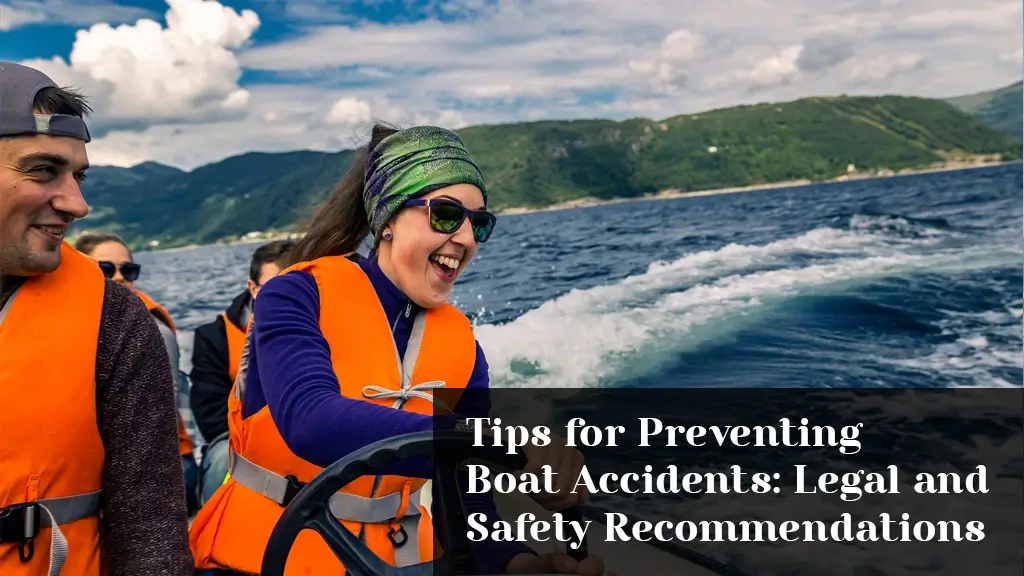Introduction
Boating is a fun and exciting activity that many people enjoy during the warm months. Whether it’s a day out on the lake or a trip along the coast, being on a boat can create wonderful memories. However, with the joy of boating comes the responsibility of keeping everyone safe. Boat accidents can happen, and they can lead to serious injuries or even loss of life. In this blog, we will share some tips to help prevent boat accidents. We will also discuss some legal recommendations to keep you and your loved ones safe while enjoying the water.

Understanding Boat Accidents
Before we dive into tips for preventing boat accidents, it’s important to understand what they are. A boat accident can happen in many ways. It can involve collisions with other boats, running aground, or accidents caused by bad weather. Sometimes, people can fall overboard or get hurt while swimming near the boat. Knowing the common causes of boat accidents can help us take steps to avoid them.
Safety Recommendations
Following are some safety measures one must consider to prevent boat accidents.
Always Wear Life Jackets
Wearing a life jacket is one of the best ways to stay safe on the water. These jackets are designed to keep you afloat if you accidentally fall into the water. Everyone on the boat, especially children, should wear a life jacket at all times. Even strong swimmers can find themselves in trouble unexpectedly. A life jacket can be a lifesaver in such situations.
Keep a Proper Lookout
Having someone designated as a lookout is crucial when you’re out on the water. This person should remain focused on what’s happening around the boat. Distractions can lead to accidents, so it’s wise to have a lookout while another person operates the boat. This way, you can spot potential dangers early and take action to avoid them.
Follow Speed Limits
Just like cars, boats have speed limits, and they exist for a reason. Adhering to these limits is essential for safety. Speeding can make it difficult to react quickly to sudden obstacles or other boats. By going at a slower pace, you give yourself more time to respond to unexpected situations. Additionally, slower speeds can enhance your ability to enjoy the scenery and the experience of being on the water.
Avoid Alcohol While Boating
Drinking alcohol while boating is not just risky; it can be deadly. Alcohol can impair your judgment and slow your reaction time. Just as you wouldn’t drive a car after drinking, you shouldn’t operate a boat while under the influence. If you plan to drink, arrange for a sober driver who can safely operate the boat. This decision can help ensure that everyone enjoys a safe and fun day on the water.
Check the Weather Before You Go
Weather conditions can change rapidly, especially on large bodies of water. Before you set out, always check the weather forecast. If storms, high winds, or rough waters are expected, it’s best to postpone your trip. Being aware of the weather can help you avoid dangerous situations. If you’re already on the water and the weather takes a turn for the worse, be prepared to head back to shore without delay.

Legal Recommendations
Following are the legal recommendations.
Understand Boating Laws
Every state has its own set of boating laws, and it’s crucial to familiarize yourself with them before you hit the water. These laws can include requirements for boat registration, safety equipment, and age restrictions for drivers. Knowing and following these laws not only keeps you safe but also helps you avoid legal troubles.
Take a Boating Safety Course
Many states mandate that boat operators complete a boating safety course. Even if it’s not required in your state, taking such a course is highly beneficial. These courses cover essential topics like navigation, emergency procedures, and safe boating practices. Being educated about boating can make you a more responsible and safer boater, which is important for everyone on the water.
Have Insurance for Your Boat
Like cars, boats can be involved in accidents. Having insurance can protect you financially if something goes wrong. Boat insurance typically covers damage to your boat, injuries to others, and legal fees if you find yourself involved in an accident. It’s wise to consult with an insurance agent to discuss the best coverage options for your needs.
Report Accidents
If an accident occurs, it’s vital to report it. Most states require you to report boat accidents that result in injury, death, or significant property damage. Reporting the incident ensures that everyone gets the help they need and can protect you legally. Make sure to gather information about the accident, including details of what happened and any witnesses present.
Conclusion
Boating can be a fantastic way to spend time with family and friends, but safety should always come first. By following the tips we discussed, you can help prevent boat accidents and ensure a fun experience on the water. Remember to wear life jackets, keep a lookout, and obey the rules of the water. Understanding the legal aspects of boating can also help you stay safe and avoid problems. With a little preparation and care, you can enjoy all the beauty and excitement that boating has to offer. Stay safe and happy boating!

